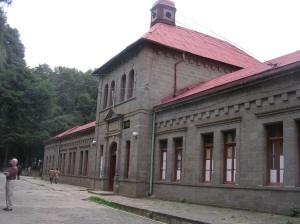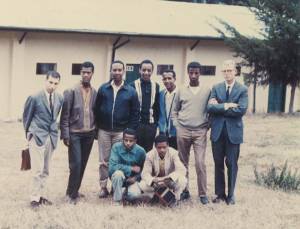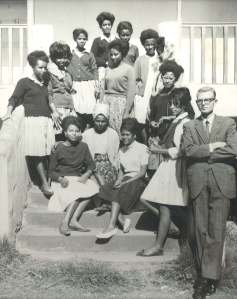Memoirs: Remembering Tafari Makonnen School, Ethiopia
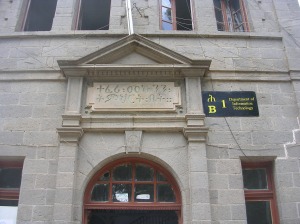
HIS IMPERIAL MAJESTY’S NAMESAKE
I’d loved teaching at Tafari Makonnen School, so it was a must stop during my visit to Addis Ababa last May. My Ethiopian friend Tesfagiorgis Wondimagegnehu had graduated from Tafari Makonnen, known these days as the Entoto Technical and Vocational Training College, in 1967, so he was able to arrange for a guided tour of the campus on the second day of my visit. As a Peace Corps Volunteer, I’d taught English and ancient history from 1964 to 1967 at Tafari Makonnen, which in those days was widely regarded as Ethiopia’s premier secondary school. Named after Ras Tafari Makonnen – Haile Selassie before his coronation as Emperor of Ethiopia in 1930 – Tafari Makonnen School was, if I recall correctly, the first secondary institution re-opened after the Italian occupation during World War II. The Emperor, deeply concerned about his namesake, personally invited a group of French Canadian Jesuits to administer the re-opened institution, whose subsequent stellar academic performance proved the wisdom of his decision. When I arrived at Tafari Makonnen in September 1964 – a 22 year-old with a newly minted BA degree from the University of Illinois, a couple of months of teacher training and absolutely no teaching experience – I was, indeed, fortunate to be taken under the wings of the headmaster, Maurice Richer, and a number of superb mentors among the Jesuit fathers, most notably Marcel Gareau, a masterful history teacher who taught me how to bring the subject to life in the classroom.
EDUCATING FUTURE LEADERS OF ETHIOPIA
Teaching at Tafari Makonnen School was an immensely satisfying experience for a number of reasons. Not only was teaching a close fit with my skills and temperament, it was also a heady experience to be part of a tremendously important, high-stakes enterprise: educating the future leaders of Ethiopia. Tafari Makonnen was an elite public school with an extraordinary record of sending its graduates on to higher education in a country that so desperately needed university-trained citizens, and we TMS teachers were keenly aware that our students would lead their country into a new era after the long reign of Emperor Haile Selassie. Furthermore, the fact that the overwhelming majority of the students I taught at Tafari Makonnen School took education very, very seriously, as their preeminent path to a rewarding professional career and a life of economic security – neither within the reach of the great majority of Ethiopians – inspired us to even greater effort in the classroom. I don’t think any of us TMS faculty members in those days questioned the importance of our work to our students’ future lives and to Ethiopia’s future development.
SURFACE IMPRESSIONS OF TMS TODAY
Based on a mere hour-long guided tour of the Entoto campus over the lunch break, which didn’t include observing any classrooms in session, I’m not qualified to comment on what’s happening educationally at this latter-day incarnation of the Tafari Makonnen that I knew almost fifty years ago. The campus looked pretty familiar in terms of physical configuration – with most of the buildings from my days there still in use – but the pervasive aura of physical neglect saddened us as we walked around campus. Not surprising, we saw little evidence that money was being invested in physical maintenance. Probably the most dramatic surface change I noticed from my days at Tafari Makonnen in the 1960s, beyond the physical deterioration, was social: boys and girls holding hands and strolling arm in arm, something I never saw at on the Tafari Makonnen campus I knew. So cultural change marches on, at least in the capital city.
As Berhane Mogese, Tesfagiorgis, and I strolled around the campus of what had been Tafari Makonnen School, my mind was flooded with vivid memories of my teaching days there. I’ll share three of my trips back to the past with you.
A RADICAL EDUCATIONAL EXPERIMENT PAYS OFF
Berhane, Tesfagiorgis, and I enter the handsome stone-faced building that you see straight ahead as you drive down the road leading to the campus, just past the flag pole where students in my day assembled for the ceremonial raising of the Ethiopian flag every morning before filing into their classrooms. When I was teaching at TMS, this building housed the headmaster’s office and, I think, 10th, 11th, and 12th grade classrooms of what was then known as the school’s Academic Section. We’re standing by the newly re-installed bust of Ras Tafari Makonnen at the foot of the stairs leading to what was in my day the teachers’ second floor common room, where we faculty members prepared lessons and marked papers between classes. Standing there with my friends at the bottom of the stairs, I’m suddenly transported back almost fifty years. In my mind’s eye, it’s late morning in October or November 1966, and I’m sitting at my desk near the door to the common room, correcting student copybooks, when I hear “Psst: Mr. Eadie.” Wondering what’s going on, I get up, go to the door, and find my whole 11th grade girls’ Commercial Section English class lined up single file on the stairs. Standing at the head, the class prefect, Konjit, I think her name was, says: “We’ve had a meeting, Mr. Eadie, and we decided to come and ask you to return to class. We promise to work very hard from this point on.” Thus ended on a positive note an audacious educational experiment that might have caused me real problems with the TMS administration, had they been aware of it, and, in the States, would probably have cost me my teaching position. Looking back, I’m amazed at the temerity (ignorance?) of my 24 year-old self.
So what’d led my 11th graders to march almost a quarter-mile across campus from what was then the Commercial Building to find me in the teachers’ room? Well, earlier that morning in that 11th grade girls’ English class my growing frustration with the girls’ lackadaisical work came to a head when, once again, the majority weren’t prepared for class. I was convinced they were a bright group of students who could perform academically as well as the boys in the Academic Section if they only believed in themselves and really tried, but they clearly didn’t think so. With absolutely no forethought, much less planning, I announced to the girls, who sat there mouths agape, stunned: “That’s it. I work too hard to put up with this laziness, ladies. I know you can do good work, if you only cared, but you don’t, and so I don’t anymore. I’m leaving class now, and I’m not sure when I’ll return, if I ever do. Konjit, please make sure the class is quiet for the rest of the period. Goodbye!” Then I walked out and headed across campus to the teachers’ room. Now, after the girls have made the effort to come find me and invite me back to class, what can I do but agree to return? So I walk down the stairs and back to class with my 11th graders that morning, and I’m pleased to report that they became an exemplary English class, eager to learn and always prepared for class for the rest of the year. How’s that for meticulously planned educational reform? Who knows? Maybe my lack of good common sense at 24 was in some ways an asset.
After returning to the states, I’d think every now and then about my radical educational experiment at Tafari Makonnen School, and I’d wonder about its long-term impact. Then one day in the early 1990s, my answering service called to say that they had a message from the Ethiopian Ministry of Education, asking me to call. Curious, I immediately punched in the number that’d been left, which connected me to the office of the Minister of Education. When I announced who I was, I was immediately put through to the Minister, who turned out to be one of my former students from that 11th grade girls’ English class, Genet Zewde. I’m obviously not reporting the results of a scientific survey, but I was gratified to hear from Genet, who is now Ethiopia’s ambassador to India, that she’d recently spoken at a women’s conference, where she told the story of a young Peace Corps teacher who by walking out of class one day taught her a powerful lesson about the importance of setting high expectations and meeting them.
MAKING AMENDS TO MY 10TH ENGLISH GRADE CLASS
A few minutes later, Berhane, Tesfagiorgis, and I have moved through the foyer of the same building to the classrooms circling a courtyard. We’re standing at the door of a classroom that belonged during my TMS teaching days to my 10-C boys’ English class in the Academic Section; again I’m transported back almost a half-century. As a 22-year-old,
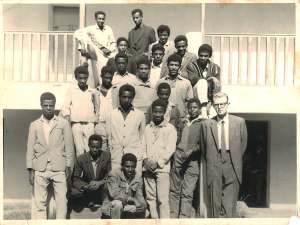
one of my many flaws was, and I must confess continues to be, a tendency to exercise my caustic sense of humor without thinking about the consequences. I can see my 10-C students sitting there almost a half-century ago, as I return corrected copybooks. I see myself make a sarcastic comment about the class’ performance; I don’t remember exactly what I said. Anyway, I can tell that I’d offended many in the class, but I don’t give the matter another thought before returning to class the next day. I’d dumbly discounted one of the traits I most admired about my Ethiopian students: their tremendous pride and sense of dignity. I see myself walking into 10-C the next morning, and no one stands. They just sit there, glowering at me. Now, you should know that students at Tafari Makonnen, and probably at all schools around the Empire, in those days stood when the teacher entered class and also when reciting or answering questions. So there I am facing my 10-C boys. Their not standing is an unambiguous insult, and as I stand there, my heart’s thumping and I can feel the blood rushing to my cheeks. A minute or so passes as we face each other. Then the class prefect stands and announces: “Mr. Eadie, you insulted us in class yesterday, and we want an apology.” Thank heaven, I’m able to swallow my pride and apologize. The class then stands, I invite them to sit, and we get back to work on that notoriously hard-to-explain
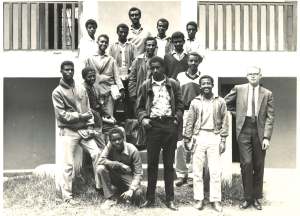
subjunctive tense. I’d learned an invaluable lesson from the class, one that I took to heart: No matter how diligently you prepare or how well you acquit yourself in the classroom, you never earn the right to treat your students with less than full respect. Believe me, for the rest of my days at Tafari Makonnen, my tongue was under better control, and I have the dignity and pride of my 10-C English class to thank for that important lesson. By the way, the boys in 10-C were unfailingly polite for the rest of our year together.
BRINGING SEX ED TO ANCIENT HISTORY
And as we stroll by the row of what had been 9th grade classrooms behind the administration building, I suddenly find myself smiling as I recall an incident in one of my 9th grade ancient history classes. I walk through the door, business-like and solemn as usual, that morning, and, inviting the class to be seated, I turn to open the two hinged blackboard sections that had been folded over the center section, so I can outline today’s lecture – if I recall correctly, about the Code of Hammurabi. I notice several students smiling as I turn, but don’t think much about it since they’re usually in a good mood after my Peace Corps housemate Randy Sword’s biology class. In addition to being an excellent teacher, Randy, now a very successful physician in the Los Angeles metro area, was also a fun-loving guy who managed to entertain while getting his points across. So, opening the blackboard, I’m struck speechless as I confront Randy’s large, vividly colored drawings from the sex ed class he’d taught immediately before mine. I stand there dumbfounded while the 9th grade boys are convulsed with laughter. But I soon join in the laughter before getting to the considerably drier world of ancient Babylonia. I did and do subscribe to the notion that all work and no play…….
WHAT DIFFERENCE DID OUR TEACHING MAKE?
On a more somber note, over the decades that have passed since my Peace Corps teaching days at Tafari Makonnen School almost a half-century ago, I’ve pondered a very complex question that has no easy answer: What difference did my and my Peace Corps teaching colleagues’ efforts in the classroom ultimately make in terms of the long-run economic and political development of Ethiopia? Over the years, it’s been gratifying to hear from former students who believe that in some modest way my teaching has helped them build successful careers in medicine, law, education, social services, etc., but to be honest, the great majority of success stories I’ve heard about have to do with Ethiopians living in the United States. That’s not at all surprising when you consider that the dark period under the Derg and Mengistu Haile Mariam – when even being a high school or university graduate made you a prime target for imprisonment, torture, and execution – lasted for 17 years, until 1991. However, there are former students like Tesfagiorgis Wondimagegnehu, Berhane Mogese, Tesfamichael Tekle, and Genet Zewde who have managed to build productive careers and satisfying personal lives while remaining in Ethiopia, despite the challenging, often dangerous times they’ve lived through.
But these are individual success stories that tell little about the long-term impact of our work in the classroom so long ago. I’ll address this question in a future blog as part of my Addis Ababa Homecoming series.
©Douglas C. Eadie All Rights Reserved : EntwinedLives.com


